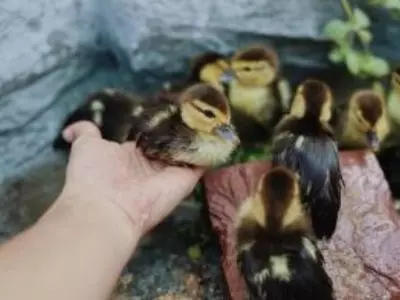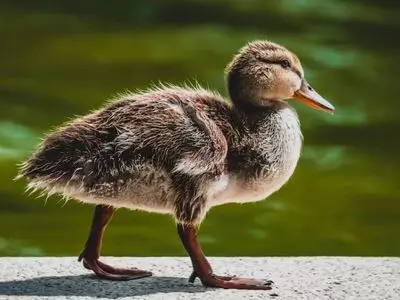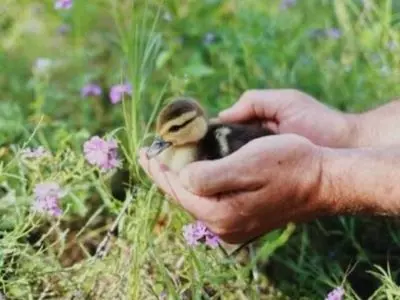No products in the cart.
Ducks
How to Train Ducks to Free Range (and MORE!)
At first glance, ducks may seem to be simple animals that don’t do much other than lay eggs, swim, and fly – but ducks are actually intelligent creatures that can be named, trained to perform tricks, follow their owner, and more.
The ideal age to start introducing yourself to a duck is around 3 days old, so they learn to trust you and imprint on you.
We’ll go over how to train ducks to free range, to be used to pets and holding, and even respond to their name!
*This post may have affiliate links, which means I may receive commissions if you choose to purchase through links I provide (at no extra cost to you). As an Amazon Associate I earn from qualifying purchases. Please read my disclaimer for additional details.
How to Train Ducks
Ducks are very easy to train, which could come as a surprise to some people.
You can teach your pet ducks to free range and return to their pens on their own, feel comfortable being pet and held, and even respond to their names if you have the appropriate motivation and a little patience.
The trick is to gradually introduce them to various conditioning techniques and associate that technique with something positive until they reach the point when they begin to adapt.
Read More: How to Keep a Duck Pond Clean Naturally. Clean ponds = healthy ducks. Here are the steps to take!
Training Ducks to Free Range

Leave the Pen Door Open
After the first few days of adjustment, your ducks can come and go as they want. At first, they could be hesitant to leave.
Time, though, will help them overcome their fears and develop an interest in the outside world.
- It’s not a good idea to try to force your ducks out of their pen. When they’re ready, they will leave on their own.
- Young ducks are more likely to explore outside their enclosure if there are already adult ducks there.
- A few mealworms in a dish should entice your ducks to come out of their enclosure.
Read More: Are Baby Ducks Called Chicks? Learn all about baby ducks in this quick guide!
Lead Your Ducks Back to the Pen at Night
Once dusk falls, they will typically return to the shelter automatically, but if they appear uninterested, you may need to lead them back.
With patience and a long stick or pole, herd your ducks back toward the pen’s entrance.
You can also feed your ducks at the end of the day, which will get them into a routine of going back into the pen and encourage them to follow you.
Here’s a video on training your ducks to come back to their pen:
Read More: Why Do Ducks Wag Their Tails? Everyone knows that signature waddle and wag of ducks. Here’s why they do it!
Repeat a Daily Routine
Allow your ducks to free range during the day, but make sure to get them back into their pen before dark.
In a matter of weeks, they’ll have everything figured out, and you and your ducks will be in a free-range routine.
- Even if you opt to free-range your ducks, you need still keep them confined in a pen at night to protect them from wandering off or being snatched by predators.
- Your ducks will benefit from having some freedom to wander. It’s good for their health, keeps them nourished, and reduces the number of pests in your yard.
Read More: What to Do for a Duck with a Broken Leg. If your duck has a hurt leg, here’s a brief guide on what you can do!
Hand Training

Put a handful of shredded romaine lettuce or some live mealworms in the palm of your hand.
These snacks will be used to coax your ducks into whatever you’re getting them to do.
- Fruits, veggies, herbs, and whole grains are among ducks’ favorites. Some of their preferred foods are seeds, berries, beans, corn, and greens.
Introduce Touch
While the ducks are feeding from your hand, slowly extend your other hand and pet their heads.
Usually, ducks will be so preoccupied with the food that they won’t even notice you touch them.
Petting them gently and introducing your ducks to being handled will ease their anxiety and prepare them for future, longer periods of contact.
- Since ducks are prey animals, if you grab them too quickly or roughly, they may run away. Let them come to you.
- Especially while they’re young, ducklings require gentle handling.
- Be sure to give them time to warm up to you as it can take them a while to adjust to human contact.
Pick Them Up
When your ducks are used to being pet, you can try to pick them up.
Picking up ducks that are comfortable with being held is extremely useful, especially in the case of vet checks or while clipping duck wings.
To pick up a duck, put your hands over its wings, bringing them close to its body, and lift it.
Keep one arm under the duck’s body to keep its legs from flailing and to distribute its weight.
Speak softly to it, and after a few seconds, set it back down.
This can help the ducks to get used to you handling them.
- It may take some time for ducks to get used to being held. Get them used to you by petting them with both hands or luring them into your lap with treats.
- Don’t force a duck to be held. If the duck is visibly or audibly stressed, set it down. Positive reinforcement training isn’t just for dogs!
Your ducks will get used to being petted and eventually won’t run away when they see you reaching out to them.
Read our related article on How to Pick Up a Duck Without Hurting It for more tips!
Training Ducks to Respond to Their Names

Call Them as Often as Possible
Use your duck’s name frequently when engaging with it.
Any time you interact with it, such as when you feed it, pet it, or return it to its pen at the end of the day, is a good time to do this.
Use a reasonably loud and clear voice when talking to it so it understands you’re addressing it specifically.
Try Calling Them to You
Call your duck’s name. Eventually, your duck will learn to associate the sound of the name with you after hearing it often.
You can also reward your duck with treats when they come to you after being called.
This will help them to associate the sound of the word with food.
Read More: How Long Do Ducks Live? We explore different breeds of ducks and their lifespans in this guide!
Conclusion
Ducks are surprisingly fun and easy to train whether you’re looking to have them understand their name, know a routine, do tricks, or be trained to be handled by humans.
It’s a good idea to get into a routine as early as possible. Make sure to be consistent, and with time, you’ll see results!

